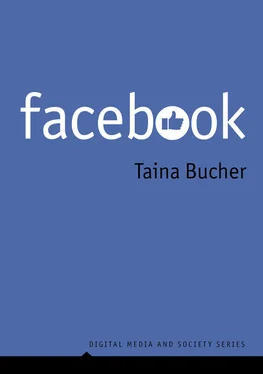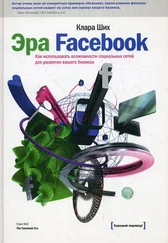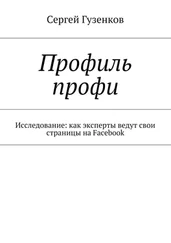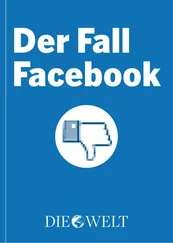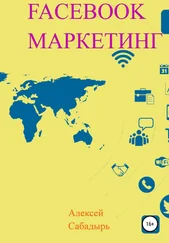An orientation approach asks us to attend to the ways in which the object of analysis affects ‘what is proximate’ and ‘what can be reached’ (Ahmed, 2006: 3). What matters in how ‘we come to find our way in the world’ (Ahmed, 2006: 1), however, is not always a given. As Ahmed writes, ‘depending on which way we turn’, the world may take on new shapes and meanings. The question is what makes us turn one way or the other in the first place? In this book, I suggest that Facebook constitutes one particularly powerful orientation device, in that it shapes ‘“who” or “what” we direct our energy and attention toward’ (Ahmed, 2006: 3). This holds true whether we think of Facebook’s algorithms and platform design directing people’s attention, its de facto role as a dominant news source, or its persistent position as a centre of attention in policy circles, electoral politics and surveillance capitalism. True, even the slightest sound, strange smell, or unexpected touch can make us turn, but nothing seems quite as disorienting and commanding of our attention in the algorithmic media environment as Facebook. When things orient, they take up space, they make an impression, render other things more or less probable, provide a path for further direction, suggest what is important, put in place. As we will see throughout this book, this is exactly what Facebook does. Importantly, as a global orientation device of massive scale, Facebook does not merely take up space. It also shapes it in fundamental ways.
Facebook has become so deeply engrained into culture and society that the company’s origin story as a college network for the few and privileged, programmed by former Harvard student and dropout Mark Zuckerberg and a couple of his friends, is well known. The founding myth tells the story of a 2003 date night gone bad. Bitter and frustrated, young Zuckerberg decides to create a juvenile ‘hot-or-not’ site called FaceMash, which asked fellow Harvard students to compare their female classmates and judge their relative attractiveness. Zuckerberg hacked into the websites of nine Harvard houses to gather the photos of the women. He then wrote the code to compute rankings for every vote received. Thirteen weeks after the creation of FaceMash, and after almost having been expelled from Harvard University as a result, Facebook launched as a Harvard-only social network in February 2004.
In an early interview with the American news channel CNBC, Zuckerberg described Facebook as:
An online directory that connects people through universities and colleges through their social networks there. You sign on. You make a profile about yourself by answering some questions, entering some information such as your […] contact information […] and, most importantly, who your friends are. And then you can browse around and see who people’s friends are and just check out people’s online identities and see how people portray themselves and just find some interesting information about people. (CNBC, 2004)
In subsequent interviews, Zuckerberg has reiterated these humble beginnings, stressing the fact that all he wanted was simply to connect his school. ‘We were just building this thing because we thought it was awesome’, Zuckerberg said in a 2011 interview to aspiring entrepreneurs at the Startup School. In a grandiose gesture of ‘bringing the world closer together’, Zuckerberg spoke at the first Facebook Community Summit in 2017: ‘I always thought one day someone would connect the whole world, but I never thought it would be us. I would have settled for connecting my whole dorm’ (Zuckerberg, 2017a). Zuckerberg’s origin story frames Facebook almost as an accident. He never even intended for Facebook to be a company, he claimed, it just happened (Zuckerberg, 2011a). The first attempts at setting up the company were ‘a disaster’. As the inexperienced college freshmen they were, Facebook was initially set up in Florida because one of the co-founders ‘happened to live’ there at the time. Even moving to Silicon Valley didn’t seem like much of a thought-out plan. Zuckerberg and his friends didn’t want to stay in Boston over the summer, so they went to Silicon Valley because it seemed like a ‘magical place’ for start-ups. After a year of working from their five-bed Palo Alto home, Zuckerberg and his friends finally moved to a real office in 2005. Zuckerberg seals the start-up narrative by casting himself in the role of the dedicated and nerdy software programmer. All he ever looked forward to when growing up, Zuckerberg said in a 2010 interview, was to write software after school.
Mark Zuckerberg and his company have come a long way from the nerdy college beginnings. These early stories are not just fraught with myths about the passionate hacker, free from commercial motivations. Narratives like these have helped to strategically build the story of Facebook and Mark Zuckerberg as a hero of geek power. As Alice Marwick shows in her ethnography of the Silicon Valley start-up scene at the end of the 2000s, Mark Zuckerberg quickly became the epitome of the next-generation tech entrepreneur, founder and millionaire. His genius status was further cemented by extensive media coverage, conference appearances, and endless references in blogs and magazines, essentially creating a sense of celebrity that propelled people’s interest in the Zuck as a meritocratic myth (Marwick, 2013). Roughly fifteen years later, countless personal portraits have been written about the Zuck: he’s been named TIME ‘Person of the Year’ 2010, and the biographical drama The Social Network is probably the only film about a nerdy CEO of an internet start-up that has been nominated for eight Academy Awards. Yet, Zuckerberg’s journey as the CEO of one of the world’s biggest software companies is not just a happy tale. At least since the 2016 US election, with all its emphasis on fake news and Russian interference, Zuckerberg has evolved from a cultural hero for the start-up generation to something of a global privacy villain. Although Facebook had been involved in many scandals prior to that – in fact, the company is famous for its many privacy scandals – it wasn’t until around 2016 that Facebook started to look bigger, more powerful and more dangerous.
Originally, Facebook was merely a website that displayed individual profiles. In 2006, its most prevalent feature, the News Feed, was introduced. That same year, Facebook launched the first version of the Facebook API, ‘enabling users to share their information with the third-party websites and applications they choose’ (Morin, 2008). In 2007, Facebook released Facebook Platform, a set of tools and products for developers to make and adapt applications for the Facebook ecosystem. Launched at f8, Facebook’s annual developer conference, Zuckerberg called on developers ‘to build the next generation of applications with deep integration into Facebook’ (Facebook, 2007a). Facebook Platform was presented as a win-win situation and a new business opportunity for developers (and Facebook). Zuckerberg explained how developers would be able to build their businesses by getting distribution of their apps through ‘the social graph’, a term he has consistently used to describe people’s real-life connections, including friendships, business connections and acquaintances. Users, for their part, would benefit from new choices available to them through Facebook.
Also, in 2007, Facebook launched Facebook Ads. According to the company’s statement, the new ad system would allow ‘businesses to connect with users and target advertising to the exact audiences they want’ (Facebook, 2007b). For advertisers, Facebook Ads enabled them to create branded pages, run targeted ads and have access to the data pertaining to Facebook’s millions of users. Alongside Facebook Ads, two products were launched: Beacon, which caused the company’s first major privacy outcry, and Marketplace, which is still in use to this day. While critics doubted that users would be adding Cola as their friend, Zuckerberg’s vision for social advertising proved bigger, and more cynical. ‘People influence people’, he said, so by combining the social actions of friends with an advertiser’s message, ‘advertisers could deliver more tailored and relevant ads’ (the ad system will be discussed in much greater detail in Chapter 5).
Читать дальше
